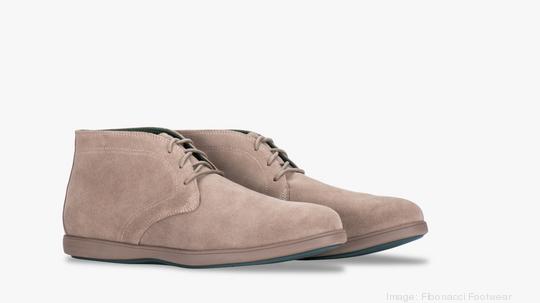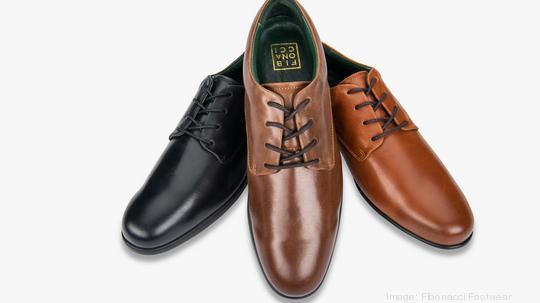
Walking the hills of Conshohocken on a near daily basis during his time at AmerisourceBergen, Andrew Crews found himself frustrated with his footwear. The dress shoes he relied on to not only look professional but function properly were repeatedly failing him. As worn-out pairs piled up in his closet, a thought nagged him: if the perfect dress shoe didn’t exist, could he create it?
He decided the answer was yes. Crews is no stranger to supply chain, logistics or analytics, having worked as the head of management information systems and analytics at Sandoz and as strategic innovation architect at Amerisource.
His projects at the drug wholesale firm yielded millions of dollars and Crews wondered if entrepreneurship might be in his wheelhouse.
During his time at Amerisource, he was logging ample miles around the office and by taking 30-minute walks over his lunch breaks to get in exercise. But his shoes weren’t designed for such strenuous efforts.
“Can't there just be a shoe that's comfortable, that keeps my foot cool in the summer, that I can put right on out of the box and it doesn't give me sores, and is nice and durable and costs $100?” he wondered. The answer, he found, was no. But for a slightly higher price point, the answer changed. That’s where his Newtown-based brand Fibonnaci Footwear looks to fill the market.
Crews has self-funded Fibonacci so far, spending between $700,000 and $800,000 to launch and get product to market, he estimates. He attributes much of that cost to the custom elements in the shoes, which were integral to giving them flexibility and durability.
The startup – which officially debuted e-commerce sales this past week – has created two shoes at the onset that seek to check all the boxes Crews outlined. Product design took over a year, with the brand first coming to fruition in December 2020. In the intervening time, he and a team of consultants created the company’s first two products: a chukka-style shoe that Crews has dubbed the Abbaci, and a derby-style shoe which will be known as the Liber.
Both feature temperature-regulating technology that has been used by space agencies, plus Ortholite insoles, and a high carbon content in the outsole, giving them durability. They also incorporated patterns on traditional wear lines – the spots where, depending on pronation and other factors, people tend to wear shoes down the most.
To ensure they met his exacting standards, Crews has put the shoes through their paces, running and even hiking in them.
Fibonacci launched with the Abbaci this week and plans to debut the Liber this fall. The Abbaci retails for $225, while the expected price point for the Liber is $249. Both come in varying colors.

The shoes share similar compositions, with the chukka having a higher ankle encased in padding. “Most dress shoes don't have that,” Crews said, noting it’s a more common design in sneakers. “That helps to alleviate a lot of the rubbing on your heel.”
Together, the names of the shoes are a take on the book title of renowned Italian mathematician Leonardo of Pisa’s “Liber Abaci.” The book dates back to the early 13th century and is often cited as one of the early texts of modern mathematics.
Crews, a self-proclaimed math geek, liked the idea of naming the brand after a mathematical concept. “Fibonacci is found in nature. And these shoes were meant to inspire people to go for walks at work and get out and be active,” he said, referencing the Fibonacci sequence in which the next number in a certain sequence can be found by adding the two previous numbers together.
Crews also plans for Fibonacci to be part of the blockchain, a sort of digital ledger of transactions. He’s already integrated a QR code on the shoes so that eventually they can be tracked on VeChain.
To build buzz for the brand and secure initial orders, Crews launched a month-long Kickstarter campaign in May. It closed on June 5 with the company bringing in over $77,000 from more than 400 backers.
Sales are exclusively through e-commerce. Through Kickstarter, about 50% of sales came from abroad, Crews said, and he anticipates that international reach continuing.

While that campaign has set the company up for a solid start, Crews expects sales will dip before picking back up. His goal is to get sales back up to $80,000 per month by fall when the Liber launches. The overall goal is slow growth. “If we hit $1 million our first year, we're in good shape. We'll have some money to launch some other products,” he said.
Crews already has his eye on what those next products might be and hopes to even launch one by the end of the year. He expects the Liber and Abbaci to be the top of the line, with more accessible versions on the market at a later point. Those would come with a smaller price tag and likely scaled back features, perhaps with a different outsole, since Crews doesn’t anticipate every customer putting dress shoes through their paces the way he has.
“I want people to really feel like they got their value out of the shoe,” he said.
What are your future goals?
We're looking to build other shoes. We're looking to have other lines and we're looking to have less expensive shoes that still hold value for the customer. I don't want to have people buy shoes like I've bought and been like, “Oh man, this is no good.” I want people to really feel like they got their value out of the shoe.
What might that look like product-wise?
We are trying to launch one [other shoe] this year. I have a shoe in mind. We're not going to branch too far from design and process, but we will probably make a dress sneaker, like a court sneaker. That'll be one of the next ones. We're looking at loafers and at a slip-on.
Why plans to sell on the blockchain?
We're going to get that going, maybe not right away, but they're going to be able to buy the shoes on blockchain. I also am looking at VeChain and a graduated supply chain. VeChain is a cryptocurrency that is trying to solve supply chain issues by having its own currency backing real life products like QR codes to track products through the supply chain. So I wanted to be a part of this. I believe in them.






